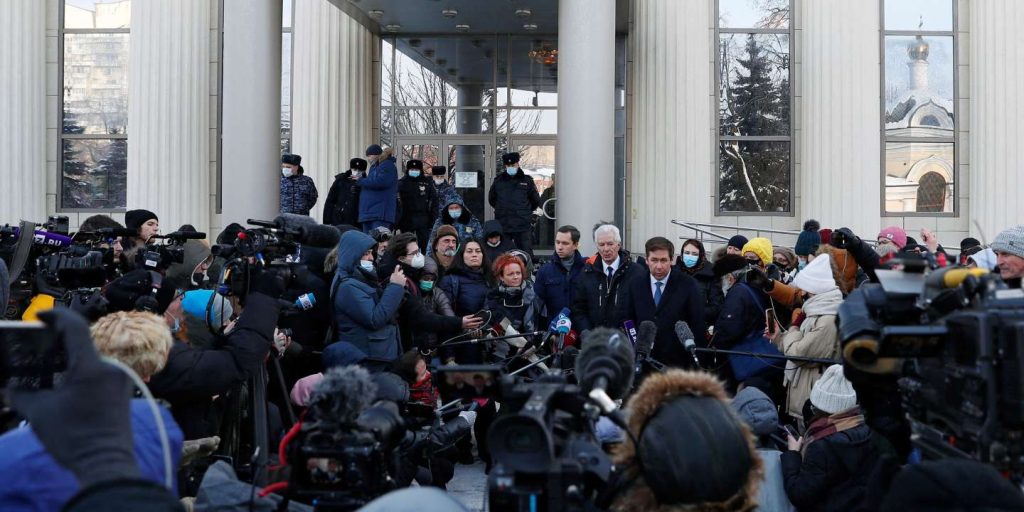
In Russia, justice has ordered the dissolution of the human rights center of the NGO Memorial

On Wednesday, December 29, a Moscow court ordered the dissolution of the human rights branch of the non-governmental organization Memorial, In the wake of the ban on the mother structure of this symbolic organization. Memorial’s Human Rights Center, a legal entity separate from the one that was dissolved on Tuesday, is accused of breaching the controversial “foreign client” law and advocating “terrorism” and “extremism”.
The attorney general ruled that “Violations of human rights and freedoms, as well as repeated and gross violations of the laws of Russia are grounds for dissolution.”. In recent years, the Center for the Defense of Human Rights has participated in the defense of human rights and political prisoners, and it has been documented by them. Wednesday’s hearing was held in the wake of the Supreme Court’s decision to dissolve Memorial International and its regional branches, a decision signaling a strengthening of the crackdown on critical voices in the Kremlin.
“If we are dissolved, it will confirm that prosecution for political purposes has become a systematic fact of our lives”As said in court Alexander Cherkasov, head of the Center for the Defense of Human Rights. Founded in 1989 by Soviet dissidents, including Nobel Peace Prize laureate Andrei Sakharov, the Memorial’s mission was to highlight the Gulag and the crimes of the Soviet Union. After the end of the Soviet Union, she was also engaged in the defense of human rights.
During the two Chechen wars, she distinguished herself by documenting abuses by Russian forces and their Chechen allies. In 2009, Natalia Estemirova, head of the NGO in this Caucasus region, was assassinated. The crime was not explained.
“Foreign agent” since 2013
Supporters of the NGO argue that Putin’s authorities want to suppress the monument in order to ignore the history of Soviet repression, as the Kremlin celebrates the legacy of the Soviet Union’s heroism against the Nazis more than the memory of Soviet repression. Millions of Stalin’s victims. The NGO accuses the authorities of complicating their work, by restricting access to archives and the identities of the perpetrators of the Soviet purges.
my court decision “It leads to the dissolution of two of Russia’s most respected human rights groups and further weakens the country’s deteriorating human rights community.”The UN human rights office told AFP. Memorial has worked tirelessly for decades to ensure these abuses [des droits] From the Soviet era you will never forget. Its closure is another frightening blow to freedom of expression in Russia.”As British Foreign Secretary Liz Truss said, on Twitter.
The lawsuits against Memorial and its Human Rights Center illustrate, in two separate legal proceedings, the extent of Vladimir Putin’s Russia’s crackdown. The year 2021 was marked by the imprisonment of the main opponent of the Kremlin, Alexei Navalny, and then the banning of his movement for “extremism”, but also the designation of many NGOs, independent media or private individuals as “agents” of foreigners. “This characterization, which reminds us of ” The enemy of the people” in Soviet times, forced the persons or entities involved to undergo tedious administrative procedures and mentioned this situation in each of their publications – this has been the case for the Center for the Defense of Human Rights since 2013.
Because they blamed Memorial International for failing this last commitment in some publications, the Russian authorities got their hands on it. The same blame is directed at the Center for the Defense of Human Rights, but the prosecution also accuses him of defending “terrorism” and “extremism” by publishing a list of prisoners’ names that include the names of members. Religious or political groups are banned in Russia.

“Unapologetic pop culture trailblazer. Freelance troublemaker. Food guru. Alcohol fanatic. Gamer. Explorer. Thinker.”
